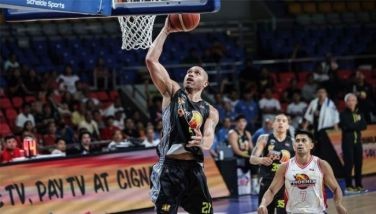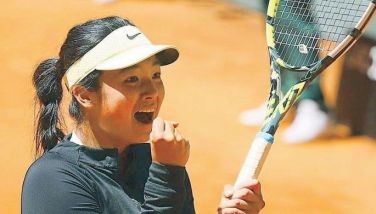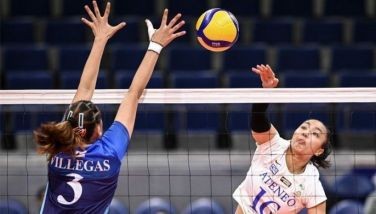Humbling experience

The Philippine women’s basketball team got a humbling experience with a crushing baptism of fire at the recent FIBA Women’s Asia Cup in Bangalore, India, where Perlas suffered five straight setbacks with an average losing margin of 37.8 points before retaining its spot in Level I by beating North Korea, 87-53.
Perlas coach Pat Aquino, 46, isn’t used to losing. In the last three UAAP seasons, he took NU to a combined 48-0 record, bringing in back-to-back-to-back championships in the women’s senior division. At the SEABA Championships last year, the Philippines was untouchable, beating regional rivals Malaysia, 77-73, Indonesia, 72-56 and Thailand, 72-52.
But in Level I, Aquino faced a new challenge. With the entry of Oceania powerhouses Australia and New Zealand, the landscape of the FIBA Asia Cup has changed dramatically. The quality of competition has considerably been bumped up. It actually took some doing for Aquino to lift the Philippines from Level II to Level I. That happened at the previous FIBA Asia Cup in Wuhan two years ago.
Ironically, the road to Level I got off to a poor start. In Wuhan, the Philippines was shocked by Malaysia, 71-64, in its first game. But Perlas refused to throw in the towel so early in the competition and rolled to five consecutive wins, upending North Korea, 68-67, Sri Lanka, 65-45,Hong Kong, 75-62, Kazakhstan, 80-73 in overtime and India, 82-76. The Philippines and North Korea finished with identical 5-1 records to earn promotion to Level I. Relegated to Level II were Thailand and India, demoted from Level I.
To be sure, Aquino went to Bangalore with eyes wide open. He knew the opposition would be extremely tough. In the latest FIBA world rankings, the Philippines was No. 49 way behind No. 4 Australia, No. 10 China, No. 13 Japan and No. 15 South Korea. His goal was to find out what the Philippines had to do to become a serious contender in the future. But he never expected such a shellacking.
Japan was the first to deal Perlas a severe blow, 106-55. Then came Australia. Aquino said Perlas had nothing to lose and despite blowing a 30-9 second period, matched the Opals point for point in the second half. In fact, Perlas outscored Australia, 42-39 in the last two quarters on the way to losing a 107-65 decision. Perlas went on to bow to South Korea, 91-63, China, 117-43 and Chinese-Taipei, 87-53. Under the new tournament format, only one Level I team would be relegated to Level II so it came down to either the Philippines or North Korea.
“Two years ago, we came back from 16 down to beat North Korea by one,” said Aquino. “But this time, we started strong and never gave them a chance. We were confident. We knew we would win. We outscored Australia, the world No. 4, in two quarters so that was an indication of how strong we can be.” The Philippines wound up trouncing North Korea to keep its spot in Level I.
Aquino said Perlas’ lack of ceiling was a major handicap. “We need more size,” he said. “We’re hoping to get Kelly Hardeman as our naturalized player but that process may take some time. If she played with us in Bangalore, maybe we would’ve cut the losing gap by 10 to 20 points but still not enough to win. I think we need to be exposed to tougher competition overseas. I spoke with Japan’s national coach (American Tom Hovasse) and he told me they practice five times a day, starting 6 a.m. and ending 10 p.m. To prepare for the FIBA Asia Cup, they went to the US twice, first to play against WNBA teams then to play against top collegiate teams like North Carolina. They also played practice games against Spain and Macedonia. We never got that kind of experience. We share the same passion for the game as Japan and they’ve got a lot of small players like us but they play with a high level of confidence. I wasn’t surprised that Japan beat Australia (74-73) for the championship.”
Aquino said in the next FIBA Women’s Asia Cup, Perlas must be better prepared to tackle the giants of the region. “We’ve got two years to prepare,” he said. “Maybe, we can reinforce our lineup with a big girl, a center who’s at least 6-4. We’ll need Kelly on board, too. Our consolation is we kept our spot in Level I which is a big achievement considering the opposition.”
There’s a possibility that FIBA will recognize Hardeman as a local but she must first secure a Philippine passport. FIBA’s eligibility rule recognizes the principle of jus soli while the Philippines recognizes the principle of jus sanguinis. Hardeman, an American by blood, was born in the Philippines and spent her first 18 years here before moving to California for university. Her family lives in the Philippines. Perhaps, the Philippines could grant her citizenship by naturalization then once she is issued her passport, the SBP could submit it to FIBA with the request to allow her eligibility as a local since she was born in the country.
- Latest
- Trending































